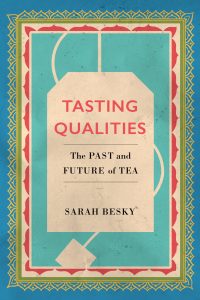 This book has been on my list for a while, especially as Besky has another work out (“The Darjeeling Distinction”); but it wasn’t something I was going out of my way to track down. The synopsis given for this book was unclear, and that prevented me from picking it up sooner. When I did, it was because I spotted it on the shelf at a secondhand bookshop. Which is usually where I scoop most of my purchases.
This book has been on my list for a while, especially as Besky has another work out (“The Darjeeling Distinction”); but it wasn’t something I was going out of my way to track down. The synopsis given for this book was unclear, and that prevented me from picking it up sooner. When I did, it was because I spotted it on the shelf at a secondhand bookshop. Which is usually where I scoop most of my purchases.
I definitely underestimated it, and this book ended up pretty heavily tabbed when I was done with it. I think it’s a solid read, something I’m happy to keep on my shelf.
The intent of Besky’s essay is to delve into what defines “quality”, a sort of nebulas goal that left me a little puzzled going in. But in doing so, she’s written one of the few modern and accessible publications that details the history of (British) tea blending, tasting, and science. The impact of Indian Identity on tea (and tea on Indian Identity) leading up to, and following, Indian Independence, and the legal and political climate surrounding tea in Britain (the legal stance on blending and health claims specifically).
All of this serves to explore the tea market’s pursuit of “quality”, but for me personally, compiles a lot of history and context that previously remained scattered across multiple texts (or never put to second hand source in the first place). There are certainly other books that detail a lot of this (Rappaport’s “A Thirst for Empire” immediately comes to mind, a work Besky references often here, but that was definitely a beast of a book), but I don’t think any works weave things together as deftly as Besky does, coupled with her own first-hand accounts learning under tea brokers in India, new and old.
Having gone into my Tea Journey reading several of C.R. Harler’s works, and being familiar with Gervas Huxley and William Ukers, I was surprised to see Harler pop up multiple times here. This is probably the most I’ve read about Harler’s life and influence. I’d tried previously on multiple occasions to research his life and role in the industry, but ran into dead ends–mostly due to a lack of digitization.
He played a role in early attempts to standardize tea tasting (especially for brokers), define terminology, and in early research of tannins and tea chemistry. I’ve been trying to find his proposed list of tea tasting terms, and any of his essays or publications outside of his three main books (Tea Growing, Tea Manufacture, and The Culture and Marketing of Tea), but unfortunately I haven’t had any luck. I’m particularly interested in this early development of tasting and cupping standards, especially of tea tasting mugs/cupping sets, unfortunately there wasn’t much there. I wouldn’t know where to begin to look.
There’s been several fantastic publications on tea as of late, on lots of different areas of interest. I just wish I was as prolific a reader as I used to be. The Tea Book List I originally started as a “personal wishlist” quickly evolved into a general means to keep track of what was out there. It’s now a resource I keep updated on teaforum.org. Many of these works are longform essays, which can be difficult to digest, and I recognize I’m getting something different out of Besky’s work than was probably intended.
All in all, I found her writing fairly engaging, but as far as essays go they can still be difficult to pick up, and I found myself putting down and picking this book up several times through 2022. I finished reading it around late summer, but was having trouble making myself sit down to write about it. Despite that, I had something like forty tabs left in the book. I managed to summarize things down to only three pages of notes.
I think this is a good read, if you’re interested in India’s tea history, especially post-British. There are some others that are weighty, but this is fairly digestible, and intermingled with personal accounts. It’s still a fairly new publication; it’s really only recently shuffled off bookstore shelves. $40 isn’t bad new, but it hasn’t come down much from that price yet.




Leave a Reply
You must be logged in to post a comment.